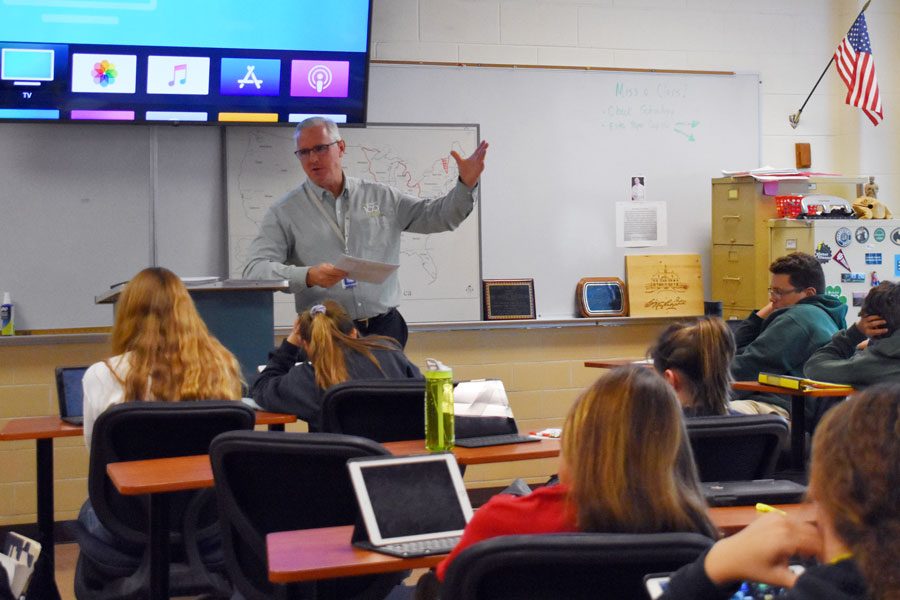Social studies teachers explain impeachment
Matthews, Twilleager provide historical perspective
Social studies teacher Mark Mathews teaches his E period dual credit American history class.
As President Donald J. Trump faces the threat of impeachment, U.S. history teacher Mr. Mark Matthews and U.S. government teacher Mrs. Jill Twilleager explain what impeachment is and how it could affect the President and the country.
What is impeachment?
Matthews: Impeachment is a formal process set in place by Article II of the Constitution in which a President can be charged with “high crimes or misdemeanors” or treason. It was put in place to safeguard against the abuse of power by a single executive.
Twilleager: The House of Representatives have sole power of impeachment (Article 1, Section 2, Clause 5) The impeachment trial is held by House of Representatives and is much like an indictment by a grand jury. If two-thirds of the House finds the President guilty of bribery, treason, high crime or misdemeanor (Article 2, Section 4), then the President has been impeached.
What does the threat of impeachment mean for the President?
Matthews: The President can be found guilty in the House of Representatives. In that case, the Senate may conduct a trial to determine if he or she should be removed from office. Both President Andrew Johnson and President Bill Clinton was impeached by the House, but neither was removed from office by the Senate.
Twilleager: If the President is impeached by the House of Representatives, but is acquitted in the conviction trial by the Senate, then he remains in office. This is what happened to Clinton and Andrew Johnson. If he is found guilty by a two-thirds vote in the Senate as well, then he is removed from office.
Is the reasoning behind impeachment valid?
Matthews: As far as the reason for impeaching President Trump, it isn’t clear yet. He hasn’t been charged with a crime, but just about anything can be considered a high crime or misdemeanor. There really is no standard. So did the President violate his Constitutional oath by asking the president of Ukraine to check into Hunter Biden’s business? It is unclear.
Twilleager: I will not answer that as it could show political leaning.
What do you think of the President’s reaction on Twitter to the impeachment process?
Matthews: Twitter is an interesting thing. Certainly no President has ever used anything like it to communicate to the American people and the world. I often find the President’s tweets irreverent, but he certainly has the right to write whatever he thinks. I wouldn’t do it, but then again I’m not a billionaire president.
Twilleager: I will not answer that as it could show political leaning.

Whitley Walton is a junior and a reporter for the Megaphone. She is involved in EMBRACE Club, Black Student Union, GSA Alliance and Girl Up and is also...

Gracie Carr is a senior and a photographer for newspaper and yearbook. She is a member of Student Council, Riley Dance Marathon, National Honor Society...







